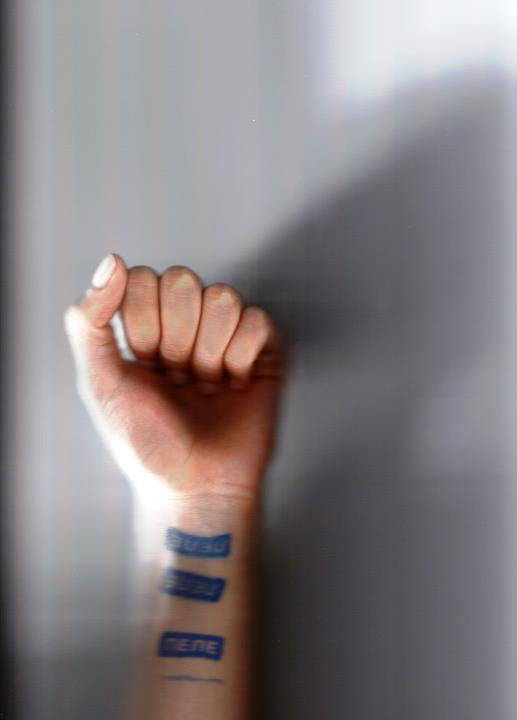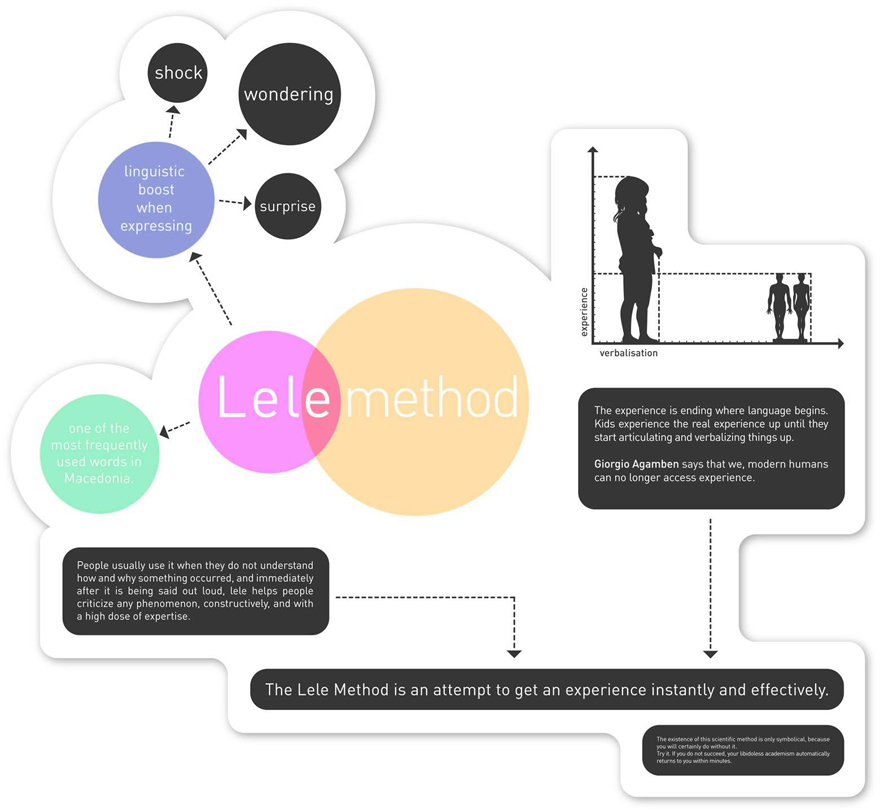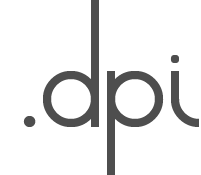Résumé
Dragana Zarevska and Jasna Dimitrovska are visual and performing artists, activists and cultural workers from Skopje (Republic of Macedonia) currently working in the context of several European countries. This newly established collaboration often works under the pseudonym Ephemerki.
Their fields of work and interest are wide - their background includes studies in cinema and comparative literature, and their current interests vary from the broad platform of performing arts to philosophy as well as visual and media arts, media archaeology, etc. Their latest work is a performance entitled The Lele Method, recently presented at one of the Balkan’s most vivid festivals for contemporary art: Akto(held in Bitola/Macedonia), and Kondenz&Locomotion (co-curatorial festivals for performing arts in Skopje/Macedonia and Belgrade/Serbia). Their work is inspired by theorists/philosophers like Donna Haraway, Judith Butler, Viktor Shklovski, Gilles Deleuze and Félix Guattari, Giorgio Agamben, and other critical thinkers on conteporaneity, art and technology.
In the following self-interview, they examine current modes of cultural funding in the Balkans (with focus on its local funding institutions) and comment on how this affects them as artists. They see language as free culture, as an open-source, and most of their works are directly related to (the awareness) of language. In this text they discuss free culture, how they contribute to, use and reuse it, and how they contextualize their work within these frameworks.
The Language as open source
What is the scope of Ephemerki’s vision?
Each of us has worked solo for a long time, and recently we decided to collaborate and we really enjoy it. Everything we do is DIY production-wise. Our work can often be seen as an overlap between theory, movement, process and production. The contextualization of these things shapes the performative events we present that test and deconstruct different versions of reality and its geography, directly related to awareness of the possibilities of language. While at the same time, we love and are fond to tease out the rigidity of academia and salon-based art, we like decoding magic, making it transparent, to go behind Wizard of Oz’s curtain and pull his pants down. The movable platform (collective) Gangplank 1 that explores technology and dramaturgy’s bonds and boundaries, (as highlighted during a discussion in Les Laboratoires d’Aubervilliers in June 2011) named this: “open-source magic”. Open-source magic is when magic is happening, but all the devices producing and supporting it are visible for the audience, for everyone. You see the Wizard and what is he exactly doing. That’s extremely generous.
As for the name of the duo – it is actually a funny derivate of Bapchorki - a band of grannies who used to sing Macedonian traditional songs in a rustic nasal style in the ‘90s and before. We consider ourselves as their ephemeral version, or at least, the ones carrying out the ephemeral part of tradition as well as producing ephemeral traditions. Our work is almost always inclined towards language and its tools, we like taking pieces from language and expropriating art pieces with a clear reference to it.
Can you please explain The Lele Method, where it derives from, and what’s the logic around it?
Lele is the most often used Macedonian word, totally devoid of meaning. This word’s only function is to emphasize a moment of shock, surprise or wonder. As a term, it can be considered a ready-made free-culture phenomenon, rather than a direct action and we just expropriate it as an art-piece. This means we take something which we do not need to CC license (or copy left in any way), and rather, use it the other way round - it is free and is already meant for everyone to use. We mark it formally as “free” by performing it. The performance itself is an experiment with how far one can get with shifting perspectives in and about free culture.
What do we actually do, when we perform The Lele Method?

Image 1
What we did is dress in uniform/corporate style, stood on the entrance door at the opening at the Akto festival’s main venue (a place where people might expect hostesses, not artists), proudly presenting the method as a corporate brand. There we put “Lele” stamps on each (entering) person’s arm, in a manner in which stamps are being put on people’s arms at a club/party door. Most of the people are surprised and confused, and immediately after being stamped, they look at their arms and by reading it out aloud, they have already made the initial step in using this so-called method. They would probably use the word “lele” even if we didn’t “allow” them to by stamping them, because you hear it 24/7 by everyone, all around, when in Macedonia. By performing this - we symbolically give them what they already have – the(ir) language.
As they proceed to the gallery space, they pass by an explanatory diagram, showing the use of The Lele Method in perceiving and experiencing.
As Russian formalist critic Viktor Borisovich Shklovski has said in his well-known essay “Art as Device,” the purpose of art is to impart the sensation of things as they are perceived and not as they are known 2.
We tried this with the word Lele which is a common, overused everyday word which initiates the subject to function through a predetermined code, moving on a specific predetermined trajectory as well. What we did is a de-familiarization. By naming a method Lele and putting it on a stamp, we gave the word a particular relevance and a different form. We made it “unfamiliar” and “difficult”, and by that, we prolonged the process of perception of that word. By trying to remove the automatism of perception, we got a new perspective of a word, of a problem. This technique has been used in the literary criticism of Russian formalism to differentiate prose from poetry, but we use it to differentiate and to delay perception.

Image 2
From mutual knowledge and mutual language, to freedom?
Occupy Wall Street, for instance, is a pure consequence of the mutual knowledge 3 (of the mutual conclusion) of a group that: time, space and social flows belong to everyone. The shrinking of public space, monopolized parks that you are not allowed to have picnic in further alienates people. This is the case with the gentrified 4 areas, where eating in parks is forbidden, and the only daily trajectory that is left is from work to restaurant to shopping mall to home, which completely marginalizes poor people. Soon public benches will require that you put a coin in them to use. It's all being generally accepted by automatization in these auto piloted societies that consist of trajectories and will eventually bring the subject to the zero free space, zero free culture. On the other side, we have people and businesses putting copyrights on words, on colors. There is such audacity in a single entity that one, due to the economic power, owns something that a civilization, a culture has generated. We want to remind ourselves that as people, we can use what we have been de-familiarized with, through marking it formally, and doing it in a funny way.
How do you perceive free culture and what is your general attitude in relation to it?
Free-culture is the theatre of the oppressed. This is probably because it looks like an autoperpetualized happening. We say autoperpetualized because it is getting “sick” and again getting “well” only by relying on its own mechanisms. It is an oxymoron, but unlike other oxymorons, free-culture gives space for letting extra (politically non-expected) things happen. It’s a must, a logical protest against what makes you make money out of it. Money you really need in order to pay your bills and play according to the rules of the world. On the other hand, culture is, and should be free by default, because at the end, it is a process, and processing. We are stating this in the sense Joseph Beuyes fantasized for bringing art again back to people. Making it people’s art.
Maybe this is not the starkest example of how bizarre the mutual dependency of these conditions (freedom-money) is, but let’s take for instance - Ancient Greece’s philosophy scene. You have the Philosophers and the Sophists. The former are considered to be the very “creme” of the labor of thought, the latter - very much the profane vendors of thought. Philosophers might have discussed freely, not charging a fee for what they say, but their financial freedom on the other hand was very much dependent on eating grapes and rolling in silk sheets with their aristocrat lovers. On the other hand, Sophists were considered more “foxy” and not very good philosophers, they were not that dependent on aristocracy, but very much dependent on the money of the mediocre “thought-shopper”, people who were buying wisdom on the street. In contemporary times we also have millions of other examples of this ambivalence and dependencies, and free culture (that’s also making demands having extra free time to work and extra generous cognitive surplus to push things forwards and teach masses about it). The result coming out of the tension between such dependencies might be what Slavoj ŽiŽek calls “the forced choice of freedom” 5. As we understand it - one acts freely and performs freedom because one is being forced to do it. Our practice in terms free-culture as an artistic duo is as it is, because we were forced to be free. The reason why people are gathering all over the globe (from the Jasmine Revolution to the Occupy movement), is because they are actually being forced to become free.
The local (Macedonian/Balkan) funding circumstances and the forced choice of freedom
To sum this up - growing up in the politically turbulent ‘90s in the Balkans, and now being put in a position to work as an artist and cultural worker with no money from our own country (while at the same time not being eligible for some EU funds as a non-EU citizen), freedom is not only an ideal, but often a forced choice too. We believe in free culture, but we do it not only because we love it, but because we must, as well. You grow up with the impression that artists are supposed to have no money for what they do, then later you realize they should apply for arts funding for what they do. Most of the time the funding processes here in Macedonia are heavy, non-transparent, and they stretch in time and the impulse for working must be kept alive meanwhile by simply – working. This is our very initial personal reason of promoting culture, and we think everyone else has their own personal reasons too before getting to jump in DIY and free-culture. Free culture is first a personal thing, and then it becomes general and common.
How is the local and regional political climate shaping our actual work?
Lately, we are very much interested in working on/with immaterial art in the form of performative events as a way of activism against the funding monopoly of the Ministry of Culture. We take this approach because of the harsh funding conditions in the Balkans, especially in Macedonia, where the national and nationalistically “colored” art in the past two to three years has been strongly endorsed and financially supported, while contemporary art is hardly recognized. In addition to this, we can also mention the recently published article in the NY Times about Macedonia, which discusses the level of authoritarianism in this country and how it has drastically increased 6. Immaterial art does not demand too much money and buying things for expropriation of a certain process visibly, and sets you free from being a hostage of the funding processes. Nevertheless, we still see a huge possibility in this area, locally and regionally, because the independent scene is getting stronger in initiatives and bonding despite the huge budget cuts on European level. Advanced grass-rooting everywhere: regional networks of independent organizations, hack-labs collaborating, long-term professional relationships, etc.
As for the hack-labs - we are starting to connect with some regional Balkan hack-labs, and now working on a project called Labor Party, a performative event which later will be converted into an installation. This will involve the usage of free-source tools like Arduino and others. It is again a project initiated from a language/wordplay tease. We were discussing the current environment in the country that is basically: “No work, only party”, which, on first sight seems like a careless wave of pleasure. The truth is – here (in Macedonia), you get a secure and nice paid job only if you are a member of the ruling political party (whatever party it is at a certain moment). Therefore, we threw a party for our friends, recorded the partying crowd with a mobile phone, and we will convert the audiovisual signal into some analog “useful” action to show that dancing at parties is actually a kind of work, labor. We wanted to equalize the meaning and the content of the word party when used in these two different paradigms - political party and dance party. By that, we to try equalize their performativity and to get to a new perspective/perception of a word again.
How do we feel about licensing acts of freedom?
Is it a necessity to license the Occupy Wall Street protests? We don’t think so. People perform acts of freedom and that’s all. With all the respect and appreciation to the history of copy-left, we do not formally license our performance works under CC, or any other license, because we would like to announce and emphasize that they are free for re-tooling, re-using and reworking by anyone without formal permission, even a formal copy-left permission. Tradition is all about that – you just transfer/transmit what you know, and it travels through time and people with no legal complexities. Since we stated that we, as Ephemerki, are working on an ephemeral tradition (and the tradition of the ephemeral), we would really like to keep to this practice of transmitting “stories” with no legal fuzz around it. The tradition of our time is fragile and short-lived, media-based, but still - able to be preserved. We of course, ask to be paid when invited personally to give a lecture, or perform/exhibit, but if someone else is re-tooling, reenacting what we’ve done, then, they can mention us as authors is they feel like. Otherwise, no one is committed to report anything to us. People can share their experiences with us if they use our work, but still – there is not pressure for that. Basically, by this, we would like to question freedom praxis further, and have in mind that our work is free by default.
We will continue working on performing acts of freedom through performing freedom of speech - by performing the language that performs us. Free culture, at the end, is all coded in the language.
Notes
1 Info about the Gangplank project/collective
2 Literary theory : an anthology edited by Julie Rivkin and Michael Ryan, Malden, Blackwell Publishing, 2004, page 16, line 14.
3 Some information on mutual knowledge
4 “Transformation and sanitization of an area of a city when first lower-income classes and later high-income classes move in, generally accompanied by the renovation of old, dilapidated buildings, an increase in rents and ultimately, the driving-out of the original resident “, Mashta # 7, magazine for creative activism, article by Silvia Font and Jasna Dimitrovska
5 Slavoj Zizek, “The Double Life of Veronique: The forced choice of freedom”
6 NY Times (Oct. 13. 2011) Concerns Grow About Authoritarianism in Macedonia
Dragana Zarevska and Jasna Dimitrovska are visual and performing artists, activists and
cultural workers from Macedonia, who also, often work together under the artistic pseudonym Ephemerki. Their fields of work and interests are very wide - their background includes studies in film making and comparative literature, the current interests vary in the very wide platform of performing arts, philosophy and visual culture.
Lately, they are very much interested in often working on immaterial art in a form of performative events (as a form of activism against the funding monopoly of the Ministry of Culture in their country) because of the harsh funding conditions in the Balkans, especially Macedonia, where the national and nationalisticaly «colored » art in the past two-three years have been strongly promoted and financially supported, while contemporary art is hardly recognized. They are also starting to work with some regional Balkan hacklabs, and now starting to develop a project called Labor Party (performative event which later will be converted into an instalation) which will be related to usage of free-source tools like Arduino and such.
Their latest works also include the performance called The Lele Method, recently presented at some of the Balkan’s most vivid festivals for contemporary art – AKTO and Kondenz&Locomotion.
